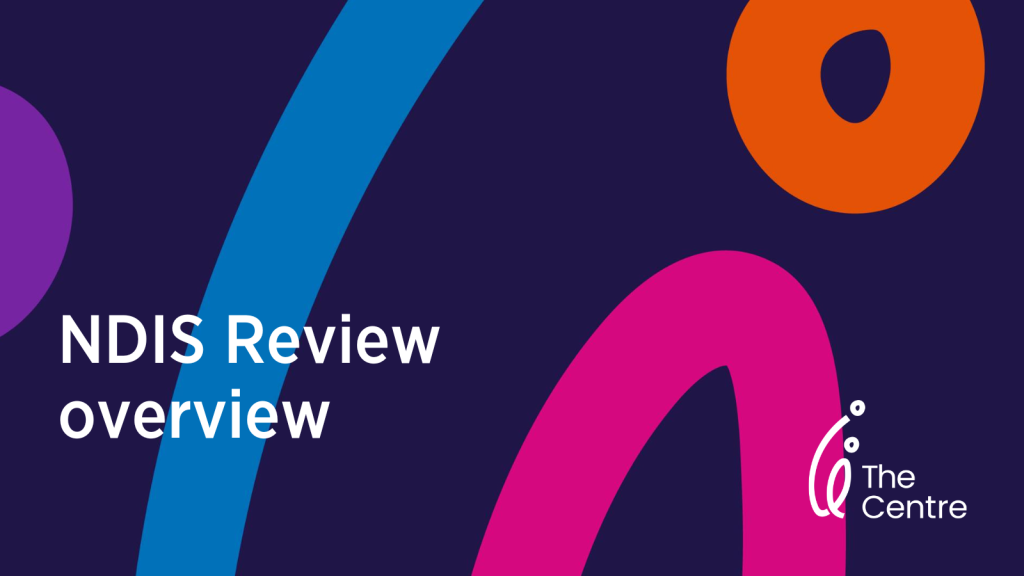The Centre has welcomed the release of the final report of the NDIS Review and the 26 recommendations with 139 actions designed to be implemented as a package of reform to help the NDIS remain viable and serving those most in need of its supports.
The Centre is committed to ensuring the voices of children with disability are central to system reforms and ensuring people get the support they need, both in the NDIS and in the community.
This NDIS Review report summary has been prepared by the Centre to give a snapshot of key findings and recommendations likely to be of most interest to members.
Overview
The Centre provided two (unpublished) submissions to the NDIS Review Panel, one of which was focused on children and young people with disability in out-of-home care and one of which was focused on the early years. While early intervention receives a strong focus in the report, there is little about children and young people with disability in the care system, other than the recognition that there are challenges in the interfaces between the NDIS and other systems including child protection. The report notes that children and families in the care system are caught between two systems, with implications for who should provide and pay for support. Given the high prevalence and complex needs of our children and young people with disability who are in care, it is disappointing not to see more about how these children and their caregivers might be better supported. Nevertheless, some of the recommendations are likely to have positive impacts on children in care without specifically targeting them.
System reform
- The report promotes the notion of a unified ecosystem of supports with a single framework for inclusion and a return to the original principle of NDIS eligibility being based first and foremost on functional impairment rather than medical diagnosis.
- To this end the report focuses on expanding existing supports outside the NDIS through a three-tier system of foundational support – which covers a range of interventions, guidance and information – more inclusive mainstream supports, and an NDIS focused on children and adults with significant and permanent disability.
- The Centre supports this rationalisation of scarce NDIS resources to focus on those who need it most, while also increasing what is available to those who need support but fall outside these categories of disability severity and permanency.
- Recommendations include the development and implementation of a Foundational Supports Strategy, redesign of information and materials to be more accessible, and nationally consistent approaches and investment in the delivery of aids/equipment and psychosocial supports outside the NDIS.
- The Centre welcomes the recommendation to invest in programs to support adolescents and young adults with disability aged 9 to 21 to manage key life transition points.
- We also support the call for a more integrated service system connecting mainstream services, including education systems, with the NDIS, and implementation of a local navigation function to assist people with disability to find supports in their community to make best use of their funding.
- In our various submissions the Centre has consistently argued for more streamlined, accessible and user-friendly NDIS processes, which the report also recommends.
- We have also supported implementation of a dedicated navigator role to better support parents and caregivers in their interaction with the NDIS. The report recommends the appointment of Navigators whose role would replace existing roles such as Local Area Coordinators and Plan Managers.
Early years and early intervention
- The report recommends as a matter of priority expansion of universally available development checks to ensure the early identification of children with developmental concerns and disability to enable early intervention. This is a critically important step to make sure children with developmental needs and disability are identified early in need and early in life.
- The report calls for ‘a continuum of mainstream, foundational and specialist supports’ to address the needs of children with disability and developmental concerns. The Centre supports these recommendations and the call for introducing a more consistent and robust approach to assessing developmental delay.
- We also welcome the focus on making sure early intervention capacity building supports are based on best practice principles and evidence, with ongoing monitoring and evaluation.
Capability building
- The report calls for investment in a capacity building program for families and caregivers of children with development concerns and disability, something the Centre has also advocated for, and investment in early supports for children with emerging development concerns and disability.
- The concept of an easy-to-use, centralised, online platform providing information about all locality supports and services for participants and Navigators has the potential to make access to the NDIS much easier for families.
- The report also recommends several workforce specific measures designed to increase the quality and diversity of the NDIS workforce.
Inclusivity
- Consistent with the Centre’s advocacy for more inclusive education in our various submissions, the report highlights the need for governments to protect the right to inclusive education in early childhood education and care and in schools for children and young people with disability. The thrust of the report is towards a more inclusive scheme in which governments, community services, disability specialist services, NDIS staff and others work in coordinated and effective ways to ensure the NDIS can fulfil its original purpose.
Overall, the Centre supports the recommended actions in this review to enable the NDIS to focus more specifically on people with severe and permanent disability. The proposed expansion of supports available to non-NDIS participants, the call for early identification of developmental concerns, and the suggestions for streamlining a complex system and processes to be more accessible to users are all welcome. For the central purpose of a more inclusive and fairer Australia for all people with disability to be realised, there will need to be much better connection between the NDIS and the service systems interacting with it, including services working directly with children and families.
Links






